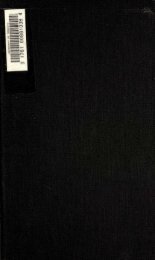Texts from the Buddhist canon : commonly known as Dhammapada
Texts from the Buddhist canon : commonly known as Dhammapada
Texts from the Buddhist canon : commonly known as Dhammapada
Create successful ePaper yourself
Turn your PDF publications into a flip-book with our unique Google optimized e-Paper software.
' without<br />
32 DHAMMAPADA.<br />
offspring cut off. On wluch. occ<strong>as</strong>ion Buddha repeated<br />
<strong>the</strong>se lines<br />
—<br />
" "Whatever exists ^ {^sansMrd) is without endurance.<br />
And hence <strong>the</strong> terms "flourishing" and<br />
" decaying." 2 A man is bom, and <strong>the</strong>n he dies.<br />
Oh, <strong>the</strong> happiness of escaping <strong>from</strong> this condition I<br />
For <strong>the</strong> life of men is but <strong>as</strong> <strong>the</strong> ear<strong>the</strong>n vessels<br />
made in a potter's mill; formed with such care,<br />
<strong>the</strong>y are all destined to destruction."<br />
^akra, having heard <strong>the</strong>se verses, w<strong>as</strong> enabled to enter<br />
on <strong>the</strong> first path of <strong>the</strong> <strong>Buddhist</strong> profession, and ohtained<br />
peace.<br />
2. On a certain occ<strong>as</strong>ion Buddha w<strong>as</strong> residing in <strong>the</strong><br />
country of ^r§,v<strong>as</strong>tt (Sewet). The E§ja Pr<strong>as</strong>enajit had<br />
been celebrating <strong>the</strong> funeral obsequies of <strong>the</strong> queen-mo<strong>the</strong>r,<br />
aged more than ninety years. On his return, he came to<br />
<strong>the</strong> place where Buddha w<strong>as</strong> and saluted him. Oh this<br />
<strong>the</strong> great teacher spake thus (after inquiring respecting<br />
<strong>the</strong> occ<strong>as</strong>ion of <strong>the</strong> visit) : " There are four things, Eaja<br />
which <strong>from</strong> <strong>the</strong> first till now have been <strong>the</strong> causes of con-<br />
stant anxiety and fear to men—<strong>the</strong> fear of old age, of<br />
dise<strong>as</strong>e, of death, and of grief consequent on death. Al<strong>as</strong> !<br />
<strong>the</strong> life of man is but <strong>as</strong> <strong>the</strong> perishing things we see<br />
around us ;<br />
to-day <strong>the</strong>y flourish, to-morrow <strong>the</strong>y are gone.<br />
Just <strong>as</strong> <strong>the</strong> waters of <strong>the</strong> five rivers 3 are ever flowing on<br />
cessation day and night, such is <strong>the</strong> c<strong>as</strong>e with<br />
man—his life is ever ebbing away." And <strong>the</strong>n <strong>the</strong> Hon-<br />
oured of <strong>the</strong> world spoke <strong>the</strong>se words and said<br />
" As <strong>the</strong> waters of a river ever h<strong>as</strong>ten on and<br />
flow away, and once gone, never return, such is<br />
1 Ch. Mng. h<strong>as</strong> often <strong>the</strong> meaning I have given it<br />
2 The Chinese fS, <strong>as</strong> is well <strong>known</strong>, in <strong>the</strong> text.<br />
' Of <strong>the</strong>i'ajyo6?<br />
—<br />
!





